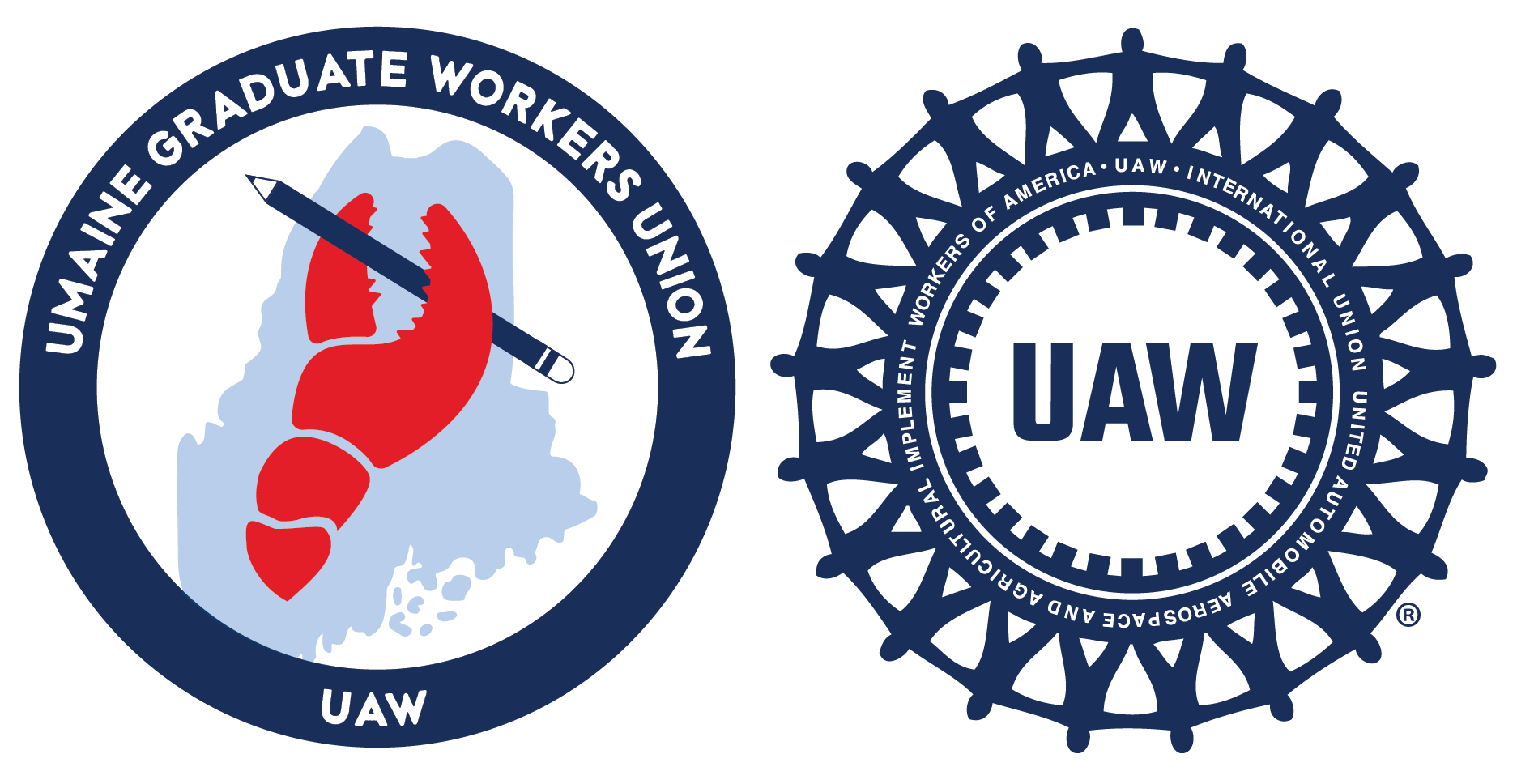Bargaining Proposal Tracker
Below you will find proposals and counter proposals from UMGWU and UMS sorted by category and date. If you have any questions, please do not hesitate to contact our UMGWU Bargaining Committee via the bargaining email (bargaining@umaine-gradworkers.org) or individually – contact info can be found in ‘Meet Your Bargaining Committee’!
Bargaining Updates
Below you will find updates drafted by our bargaining committee after each session with UMS, which which summarize the proposals, counters, and notable exchanges of a given session.
Bargaining Update #11: May 22, 2024 session – click to read
Bargaining Update #10: May 8-9, 2024 session – click to read
Bargaining Update #9: April 24, 2024 session – click to read
Bargaining Update #8: April 10-11, 2024 session – click to read
Bargaining Update #7: March 26-28, 2024 session – click to read
Bargaining Update #6: March 14, 2024 session – click to read
Bargaining Update #5: February 29, 2024 session – click to read
Bargaining Update #4: February 7-8, 2024 session – click to read
Bargaining Update #3: January 18, 2024 session – click to read
Bargaining Update #2: December 19-20, 2023 session – click to read
Bargaining Update #1: November 14, 2023 session – click to read
Bargaining Goals
Click here to read the full UMGWU-UAW Bargaining Goals
These goals were determined from a survey of a majority of UMGWU-UAW graduate workers and ratified in an overwhelming majority vote: 99.8% in favor, 512 yes, 1 no. The 14-item list is shown below:
- Improve healthcare for all
- Establish fair wages
- Increase access to housing
- Ensure freedom from harassment and bullying
- Create a more family-friendly workplace
- Foster a safe and productive work environment
- Increase transparency for job appointments and dismissals
- Broaden access to and improve retirement and other benefits
- Increase support for international graduate workers
- Improve rights to paid time off and leave
- Expand access to educational resources and professional development
- Improve transit and parking benefits
- Recognize and promote union rights and representation
- Protect academic freedom and intellectual property
Meet Your Bargaining Committee

Nikhil Brocchini
Master’s student in the Climate Change Insitute & Research Assistant
Phone: 650-766-3766
UMaine Email: nikhil.brocchini@maine.edu
Personal Email: nikbrocchini@gmail.com

Eric Brown
PhD student in Ecology & Environmental Sciences & Research Assistant
Phone: 814-490-4287
UMaine Email: eric.brown1@maine.edu
Personal Email: ebrownrma@gmail.com

David Coombs
PhD student in History & Teaching Assistant
Phone: 702-335-8709
UMaine Email: david.coombs@umaine.edu
Personal Email: dcunion42@gmail.com

Amanda Gavin
PhD student in Ecology & Environmental Sciences & Research Assistant
Phone: +1-978-518-6073
UMaine Email: amanda.gavin@maine.edu
Personal Email: amandagavin88@gmail.
Bargaining Committee Election FAQ
The primary responsibility of the bargaining committee is to negotiate an initial collective bargaining agreement with the University of Maine System administration’s team. Election to the committee obligates each member to represent and fight for the best possible contract for all members of the bargaining unit.
See below for specific responsibilities.
- Develop initial bargaining goals for ratification by union supporters across campus, using surveys, other relevant contracts, membership feedback from other sources, etc.
- After ratification of initial bargaining goals, develop and present contract language proposals to the UMS administration’s bargaining team for negotiation.
- Attend and lead negotiating sessions with the admins and Union internal caucuses or meetings in order to advance our bargaining agenda.
- Assess, analyze and respond to the UMS admin’s bargaining proposals and develop union counter proposals.
- Keep the membership and allies informed and educated about the negotiations and the process.
- Coordinate with the organizing committee, including attending the organizing committee meetings weekly and going to various working groups, and other activists on a strategic campaign to win a strong contract that can be recommended for ratification.
- Work with department leaders to help mobilize workers as necessary to help keep membership engaged as we negotiate our agreement.
- Make a recommendation to the membership on whether to approve a contract or take other actions (e.g. a vote to authorize the committee to call for arbitration authorization pursuant to Maine state law if necessary).
Committee members should assume that the time commitment will be significant. As a baseline, an average time commitment of at least 3-5 hours per week on average can be assumed, with potentially more during critical times in the contract campaign. Note that the schedule of bargaining itself is subject to negotiation with the UMS administration’s bargaining team.
What is the bargaining committee?
In order to negotiate a contract between the UMGWU graduate workers and University of Maine, 5 graduate workers will be elected to bargain on behalf of graduate workers, with support from UAW staff and resources. See below for BC candidate profiles.
Who is eligible to run for bargaining committee?
All current graduate workers who have signed UMGWU-UAW authorization cards are automatically eligible to run for the bargaining committee. Please email elections@umaine-gradworkers.org to submit your nomination. All current or former graduate workers who are current University of Maine System graduate students and have signed UMGWU-UAW authorization cards will be eligible to vote to elect the graduate workers they want to represent them.
Here is the eligibility criteria for being a bargaining committee member:
- Be a current graduate student.
- Currently be a graduate worker.
- Have signed a UMGWU-UAW authorization card.
To be a graduate worker, you must be in a position providing instruction, instructional services, and/or research services, or be a graduate student holding the title of Graduate Assistant and employed to provide administrative services.
What do I have to do as part of the bargaining committee?
- Leading up to bargaining with administration, an average of 3-4 hours a week is expected of the bargaining committee as they research the needs of graduate workers (ie. surveys, walkthroughs, etc.)
- During bargaining, UMGWU bargaining committee members are expected to meet with the administration to write a contract and to get the contract ratified by UMGWU graduate workers. An average of 3-5 hours a week can be expected at this time, with potentially more during critical times in the contract campaign..
- Bargaining committee members must be or become an active member of the UMGWU organizing committee which meets once a week for approximately one hour.
What happens if 5 or fewer people run for the bargaining committee?
In this case, those who ran will be considered uncontested and no election will be required.
